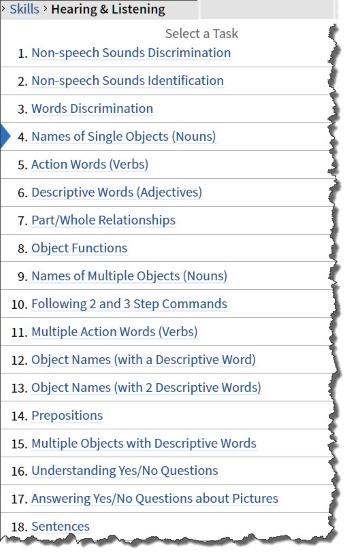Auditory Comprehension & APD* in plain-English
Learn of how your
understands understands what they hear
* APD : Auditory
Processing Disorder
DISCLAIMER: As always, I highly recommend you see a speech therapist for a proper speech & language assessment.
If you don't have access to a speech therapist, I'll give you a rough idea of how well the survivor understands what they hear. Then, you'll know what level of speech to use in communicating to them.
I was speaking to my own father last year and he told me I talk too fast. It had been frustrating him for years. Now I speak slower, and even pause to give him time to process. He's happier, I repeat myself less, and the communication is a hundred times better.
FYI - you can also get a Coach to help you choose exercises for Listening Skills with Bungalow Software's Speech & Language Subscription
Make sure they can do what you ask
Make certain that they can respond consistently in the way you ask them to. If they can't speak and you ask them a question (What do you want for lunch?) they might understand what you said but just not be able to speak the answer. If their speech is poor but their reading comprehension is fine, then you could let them choose an answer. (Not sure about their Reading? See my article on testing their reading.)
Auditory Comprehension can be impaired in several different ways:
-
 Hearing
problem: They can’t hear the the sound well.
Hearing
problem: They can’t hear the the sound well.
They need to hear the sound before they can process and understand it.
For this, It’s often helpful to have their hearing tested by an Audiologist. Make sure the Audiologist is aware of whatever speech-language deficits the survivor has. -
 Central
Auditory Processing Disorder : Difficulty processing or paying attention to
the sound. One diagnosis, more common in children than adults, is
APD (Auditory Processing Disorder).
Central
Auditory Processing Disorder : Difficulty processing or paying attention to
the sound. One diagnosis, more common in children than adults, is
APD (Auditory Processing Disorder).
There is a breakdown in receiving, remembering, understanding, and using auditory information. Hearing ability is adequate. There is a neurological basis. The ability to listen is impaired. -
Difficulty understanding the language in the speech they hear.
What does your Survivor Understand when you speak?
Test the survivor at each of the 7 Difficulty Levels (below) to find their:
- Comprehension Level
This is the level where they understand everything said to them, and it's the level you (and others) should speak to them at. - Treatment Level
This is the level where they understand maybe 50% to 90% (or, in the exercises below, they get 50-90% correct).
This is the level that they might benefit from Treatment.
You can make up exercises (I provided some for Levels 4-7) or use interactive treatment software, such as MoreSpeech.com and it's Hearing & Listening Skill Areas to easily find their ability level. If you make up exercises and they understand what they read with 100% accuracy then they can choose a written answer as their response. Not sure if they understand what they read? See my article on understanding their Reading ability.
GOAL: Find the level you can communicate to them
and what level of treatment they need.
Difficulty Levels for Auditory Processing & Comprehension
MoreSpeech.com for interactive practice

-
Non language sounds Discrimination
e.g., you ring a bell and crinkle paper. Can they tell that those are different sounds? -
Non-language sound Identification
e.g., You ring a bell. Can they point to the picture of the Bell (and not the Tiger!) to show they recognized the sound? -
Word discrimination (hearing differences between words)
Speak two similar sounding words. (Ring, Bring, etc.)
Can they tell when you have said the same word vs. different words. -
Single Word
Use this printable Picture Identification worksheet. -
Simple sentences
Use this Comprehension Worksheet, but actually read (do not show them) the questions aloud.
Have them answer yes/no in the easiest (and most consistent for them) manner: Speak, Point to a word (Yes or No), Nod /Shake head, etc. -
Complex Sentences
Use the above worksheet, but combine questions so there are two conditions to consider:
( Are you sleeping and also sitting?) or just add your own second "condition" to the question". The PC program Understanding Questions+Outloud is excellent for measuring and treating at this level. -
Complex instructions (requiring auditory memory)
Worksheet for Two Step Instructions
The PC program Direction Following +Outloud is excellent for this.
Once upon a time there was a speech therapist who realized her patients needed more therapy than insurance was providing. So she asked her husband, a software engineer if he could help. So he created interactive treatment software for her to use at work. And her patients loved it. So did other therapists. So they made it available to everyone and he worked full time creating even more programs.
I am that software engineer. And I continue to work on that software today. It's used in the top Rehab Hospitals and all around the world.
Every day is an opportunity for recovery. Don't miss a single day.
- Surprising neuroscience discovery that makes recovery possible at any age.
- Why embracing failure leads to faster recovery.
- Unlock your survivor's communication needs in 4 steps.
- How to improve speech & language at the kitchen table.
Clay Nichols
Co-founder of
MoreSpeech and
Bungalow Software
for unlimited speech therapy at home and in the clinic.
 For
3 decades, Clay has helped patients, caregivers and speech pathologists
with speech & language software. He is not a speech-language
pathologist.
For
3 decades, Clay has helped patients, caregivers and speech pathologists
with speech & language software. He is not a speech-language
pathologist.
© 2025 Bungalow Software